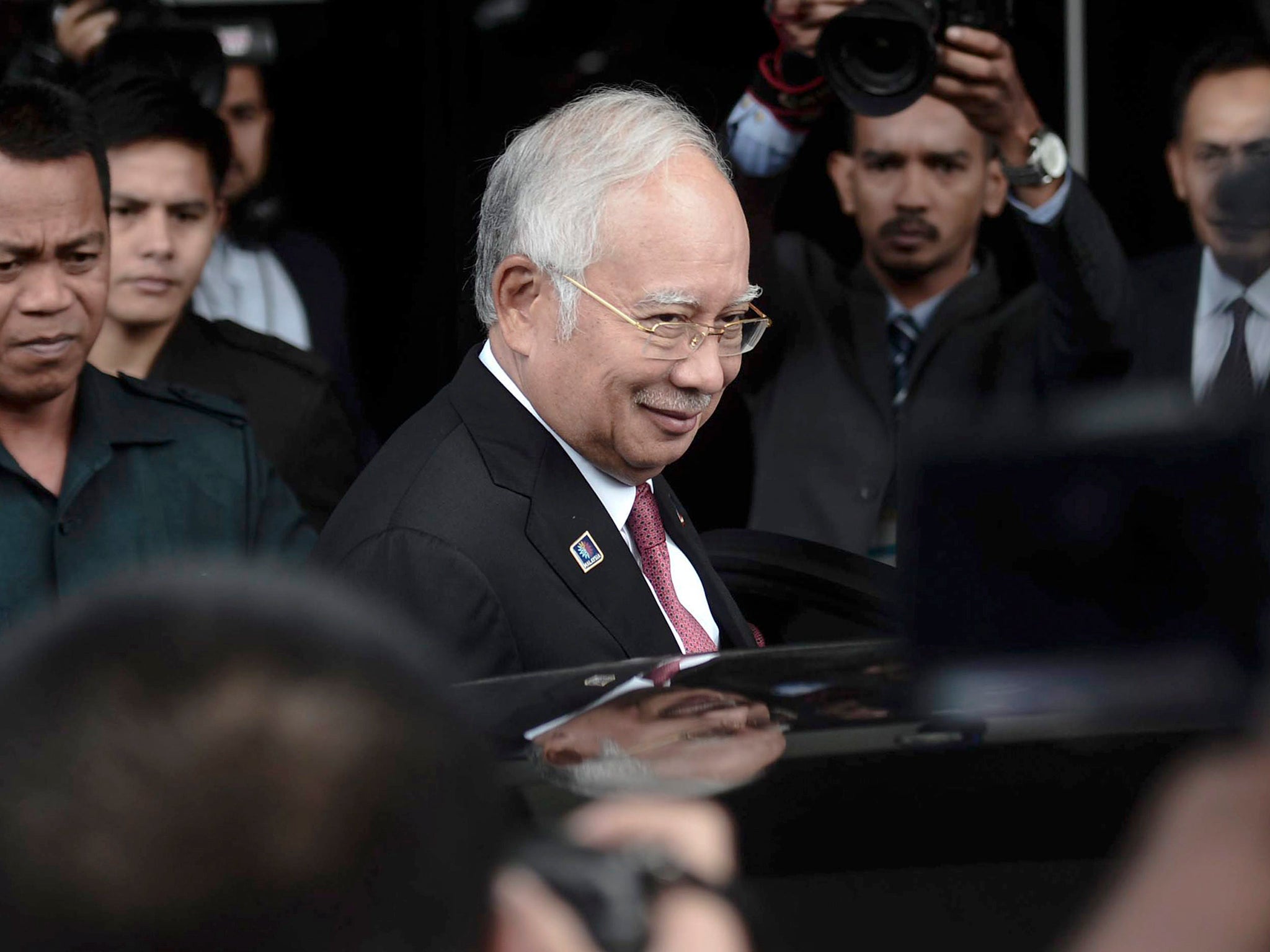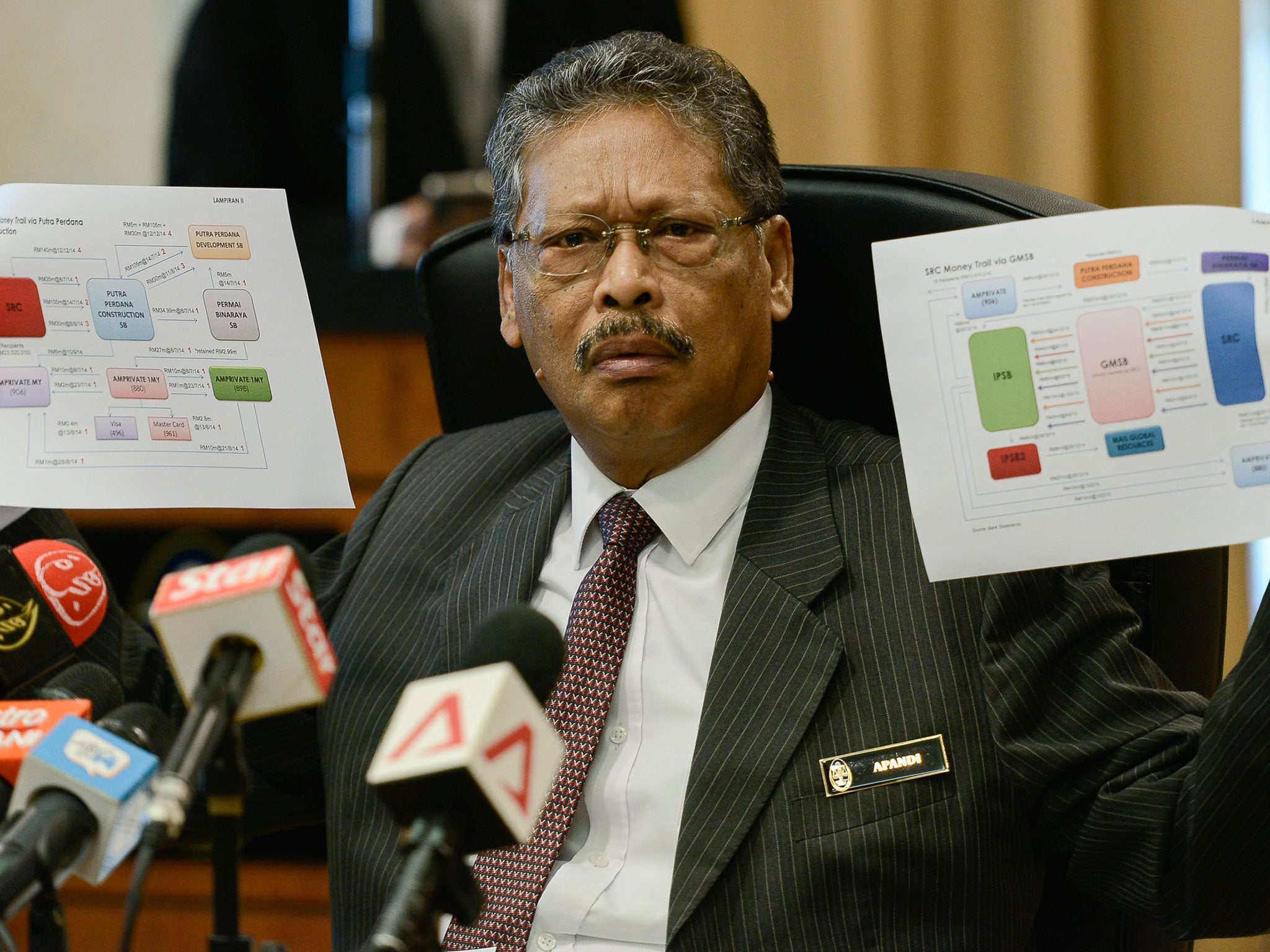Malaysia PM Najib Razak cleared of corruption over $681m gift from Saudis - by an Attorney General he appointed
The verdict? It was not a bribe but a ‘personal donation’

Malaysia’s Attorney General officially cleared the country’s Prime Minister, Najib Razak, of any criminal wrongdoing as he declared that $681m (£475m) channelled into his private bank accounts was a personal donation from Saudi Arabia’s royal family.
The decision, announced at a hastily convened press conference, was seized upon by Mr Najib as evidence that the scandal that has embroiled the political establishment for the past 11 months was now over. “He has confirmed what I have maintained all along: that no crime was committed,” Mr Najib said in a statement.
But the revelation of the $681m donation appeared to confirm many of the allegations at the heart of the scandal and raised new questions about the governance of one of Asia’s most important powers.
Rumours about vast corruption within the court of Mr Najib, who came to power in 2009, have swirled for years, focusing on his relationship to a scandal-prone banker alleged to be close to Mr Najib’s stepson, and more recently on a financier from the United Arab Emirates.
The financier and Mr Najib were centre stage in 2013 at the announcement of a joint venture between the Emirates and Malaysia which, according to the press release, was meant to create “hundreds of thousands of well-paying jobs for Malaysians” with the investment of 39 billion Ringgits – about £6.4bn – in Malaysian projects, supervised by 1MDB, a Malaysian state investment fund whose advisory body Mr Najib chairs.
But despite the grand announcement, the Emirates failed to make good on their side of the bargain, while of the $3bn raised by the 1MDB, “just over half that money is now missing,” according to opposition politician Tony Pua.
But the rumours suddenly gained more traction last July when Sarawak Report, a website devoted to shining a light on corruption in the country, published sensational and detailed allegations about the vast sum paid into Mr Najib’s account – the claim now officially confirmed by the Attorney General.
“In Malaysia,” Sarawak Report’s website states, “there is no platform allowed for those wish to bring… corruption to light and no voice given to the opposition parties who are denied access to the state-controlled media. Sarawak Report exists to provide that platform and to offer an alternative vision of justice, transparency and a fairer future.”
But after the charges against Mr Najib were published, the Report’s founder and editor, Clare Rewcastle Brown, sister-in-law of former UK prime minister Gordon Brown, found its website officially blocked on grounds of “national security”, while the Malaysian government tried and failed to have her placed on a Interpol’s “Red Notice” list of “most wanted” suspects.

The revelation about the provenance of the money paid into the Prime Minister’s account came at a press conference in the capital Kuala Lumpur. The speaker was Malaysia’s Attorney General Apandi Ali, a loyalist of the ruling party appointed to the job after Mr Najib sacked his predecessor, Abdul Gani Patail, when he showed no inclination to drop his investigation into the remittance.
Mr Najib’s critics pointed out that Mr Apandi, who as a judge once ruled that Malaysia’s Christians were not permitted to use the word “Allah” for “God”, is due to retire in weeks. They claimed that his successor, another party loyalist, had insisted that the scandal be buried before he took office.
In his statement, Mr Apandi said, “I am satisfied that there is no evidence to show that the donation was a form of gratification given corruptly. Evidence obtained from the investigation does not show that the donation was given as an inducement or a reward for doing or forbearing to do anything in relation to his capacity as prime minister.”
Mr Apandi said $620m of the sum had been “returned” after the general election. Critics claimed that the sum did not go to the Saudis but into a private account of Mr Najib’s in Singapore which has been sequestered by Singapore authorities in an investigation into illegal transfers. Mr Apandi made no effort to explain what the money was for.
Kim Quek, an opposition spokesman, said: “If the top public servant of the country can openly amass billions with impunity, why can’t lesser officials similarly enrich themselves in lesser amounts? Wouldn’t that open a floodgate of runaway corruption in the country?
“A country led by such a morally bankrupt leader would jeopardise the investment climate and cause a serious dent to the economy, which is already caught in a tailspin. There has been so much evidence made public implicating Najib, there are huge holes in the attorney general’s statements. He has answered none of the questions that have been raised. No one is going to believe this.”
Despite such trenchant comments, and bitter attacks on him by his former patron, ex-prime minister Dr Mahathir Mohamad, Mr Najib may survive: his party, the United Malays’ National Organisation (Unmo) has succeeded in ruling Malaysia uninterruptedly since independence because it protects the interests of the Malays, the country’s largest ethnic block, and tribal leaders in Sabah and Sarawak.
Loyalists of the ruling party may be unconcerned that their leader took personal possession of this huge sum from persons unknown within the “Saudi royal family”, for purposes that have not even been hinted at. But internationally, the economic fall-out could be substantial. “The only thing we can do,” Dr Mahathir said last year, “is to have the prime minister resign… or be removed. Because he is the principal person who has brought about this bad image for the country.”
Join our commenting forum
Join thought-provoking conversations, follow other Independent readers and see their replies
Comments